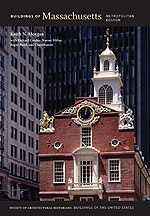Novelty Woodworks built in 1863 by the owner, John McNutt, was the earliest of the area's woodworking firms. McNutt was a builder who did the woodwork for building interiors, from warehouses to theaters, including the Cyclorama (SE3). The facade has been somewhat altered, but the basic structure remains, typical of the area's small industrial buildings. The four large ground-floor doors were used to bring in lumber, which was stored in lumber sheds in what is now the parking lot. Like many industrial buildings of this time, it has such modest decorative features as the corbeled brickwork at the top of the facade and the ends of the tie rods, which are in the form of the shields of the Massachusetts Charitable Mechanics Association.
Other woodworking businesses soon followed, as did piano and organ factories, which needed the wood for making cases. These were important and substantial industries, employing hundreds of people. Woodworkers, builders, and piano makers (employed by eleven companies) filled this area, and many of their buildings survive today. Behind the Novelty Woodworks building, for example, stands the original case factory for the New England Organ Company. It is ornamented with decorative cast-iron window lintels and tie rods, currently painted red. The block opposite these two buildings, 11–87 Wareham Street, was completely filled with woodworkers, cabinet makers, and moulding mills in the late nineteenth and early twentieth centuries. One of the larger industrial buildings in the area is Emerson Piano Company, once a major producer of pianos employing three hundred people at times. This district of the South End is still used for small industries and distribution warehouses and now harbors many florists and florist supply establishments.





















